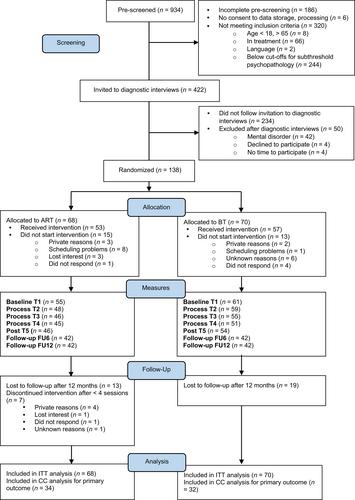跨诊断情绪调节训练在高危人群中的有效性:基于群体的训练与自助阅读疗法的随机对照试验
IF 3.8
3区 心理学
Q1 PSYCHOLOGY, CLINICAL
引用次数: 0
摘要
亚临床精神病、抑郁和焦虑症状构成精神障碍发展的跨诊断“危险状态”。情绪调节已被确定为与这些症状形成相关的跨诊断因素,这些症状可以在临床干预中成功解决。在这里,我们测试了以群体为基础的情绪调节训练是否能有效地减少痛苦,并防止在高危样本中过渡到精神障碍。方法:有令人痛苦的亚临床精神病、抑郁或焦虑症状的参与者(n = 138)被随机分配到8周的以小组为基础的情感调节训练(ART;施普林格,纽约)或一个为期8周的自助阅读疗法(BT)。在干预期间,他们每两周进行一次测量,并在6个月和12个月的随访中进行测量。在一项探索性分析中,我们在12个月的随访中测试了ART是否优于BT,以防止过渡到任何精神障碍。我们还测试了精神病理和情绪调节轨迹(通过问卷调查)以及日常生活中的情绪调节(通过经验抽样法)的差异。结果ART组在日常生活情绪调节方面比BT组有较大改善,但在防止向精神障碍过渡方面并不优于BT组。从干预前到干预后,一般精神病理学和症状有显著的纵向减少,但ART没有优于BT。结论尽管ART在改善情绪调节技能方面有效,但它对精神病理学的影响并不足以证明其优于自助方法。本文章由计算机程序翻译,如有差异,请以英文原文为准。

Effectiveness of a transdiagnostic emotion regulation training in an at-risk sample: a randomized-controlled trial of group-based training versus self-help bibliotherapy
OBJECTIVES Subclinical psychotic, depression, and anxiety symptoms form a transdiagnostic 'at-risk state' for the development of mental disorders. Emotion regulation has been identified as a transdiagnostic factor relevant to the formation of these symptoms that can be successfully addressed in clinical interventions. Here, we tested whether a group-based emotion regulation training would be effective in reducing distress and at preventing the transition to mental disorders in an at-risk sample. METHODS Participants with distressing subclinical psychotic, depression, or anxiety symptoms (n = 138) were randomly allocated to either the 8-week group-based affect regulation training (ART; Springer, New York) or an 8-week self-help bibliotherapy (BT). They underwent biweekly measurements during the intervention, as well as at a six- and 12-month follow-up. In an exploratory analysis, we tested whether the ART would be superior to BT in preventing the transition to any mental disorder at 12-month follow-up. We also tested for differences in trajectories of psychopathology and emotion regulation (via questionnaires) and emotion regulation in daily life (via the experience-sampling method). RESULTS Participants in the ART condition showed a greater improvement of emotion regulation in daily life than those with BT, but the ART was not superior over BT in preventing the transition to mental disorders. There were significant longitudinal reductions from pre- to post-intervention for general psychopathology and symptoms but no superiority of the ART over BT. CONCLUSIONS Despite its efficacy in improving emotion regulation skills, the ART does not produce effects on psychopathology that justify its recommendation over self-help approaches.
求助全文
通过发布文献求助,成功后即可免费获取论文全文。
去求助
来源期刊

British Journal of Clinical Psychology
PSYCHOLOGY, CLINICAL-
CiteScore
5.80
自引率
3.20%
发文量
57
期刊介绍:
The British Journal of Clinical Psychology publishes original research, both empirical and theoretical, on all aspects of clinical psychology: - clinical and abnormal psychology featuring descriptive or experimental studies - aetiology, assessment and treatment of the whole range of psychological disorders irrespective of age group and setting - biological influences on individual behaviour - studies of psychological interventions and treatment on individuals, dyads, families and groups
 求助内容:
求助内容: 应助结果提醒方式:
应助结果提醒方式:


